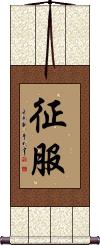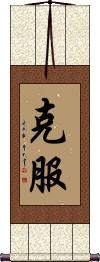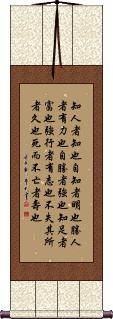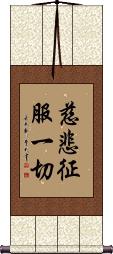Many custom options...
And formats...

Conquer in Chinese / Japanese...
Buy a Conquer calligraphy wall scroll here!
Personalize your custom “Conquer” project by clicking the button next to your favorite “Conquer” title below...
2. Overcome
3. Daodejing / Tao Te Ching - Chapter 33
4. Flexibility Overcomes Strength
Conquer / Conquest
征服 means to conquer or conquest in Chinese, Japanese Kanji, and old Korean Hanja.
This can also be translated as vanquish, to subdue, subjugation, overcoming, or, to strike.
Note: This is kind of a violent term for a wall scroll but if you really want it, we’ll make it custom for you.
Overcome
Overcoming Hardships
In Chinese, Japanese Kanji, and old Korean Hanja, 克服 means “overcome” (as in overcoming hardships, etc.). It can also mean to conquer, to put up with, or to endure.
This can be a conquest over a problem, disease, handicap, poverty, or illness. Other definitions include overcoming, bringing under control, subjugation, or victory over something.
This can be used as an inspirational wall scroll to remind someone to try to overcome difficulties that may arise in life.
Daodejing / Tao Te Ching - Chapter 33
This is referred to as passage or chapter 33 of the Dao De Jing (often Romanized as “Tao Te Ching”).
These are the words of the philosopher Laozi (Lao Tzu).
To know others is wisdom;
To know oneself is acuity/intelligence.
To conquer others is power,
To conquer oneself is strength.
To know contentment is to have wealth.
To act resolutely is to have purpose.
To stay one's ground is to be enduring.
To die and yet not be forgotten is to be long-lived.
To understand others is to be knowledgeable;
To understand yourself is to be wise.
To conquer others is to have strength;
To conquer yourself is to be strong.
To know when you have enough is to be rich.
To go forward with strength is to have ambition.
To not lose your place is to be long-lasting.
To die but not be forgotten -- that's true long life.
He who is content is rich;
He who acts with persistence has will;
He who does not lose his roots will endure;
He who dies physically but preserves the Dao
will enjoy a long after-life.
Notes:
During our research, the Chinese characters shown here are probably the most accurate to the original text of Laozi. These were taken for the most part from the Mawangdui 1973 and Guodan 1993 manuscripts which pre-date other Daodejing texts by about 1000 years.
Grammar was a little different in Laozi’s time. So you should consider this to be the ancient Chinese version. Some have modernized this passage by adding, removing, or swapping articles and changing the grammar (we felt the oldest and most original version would be more desirable). You may find other versions printed in books or online - sometimes these modern texts are simply used to explain to Chinese people what the original text really means.
This language issue can be compared in English by thinking how the King James (known as the Authorized version in Great Britain) Bible from 1611 was written, and comparing it to modern English. Now imagine that the Daodejing was probably written around 403 BCE (2000 years before the King James Version of the Bible). To a Chinese person, the original Daodejing reads like text that is 3 times more detached compared to Shakespeare’s English is to our modern-day speech.
Extended notes:
While on this Biblical text comparison, it should be noted, that just like the Bible, all the original texts of the Daodejing were lost or destroyed long ago. Just as with the scripture used to create the Bible, various manuscripts exist, many with variations or copyist errors. Just as the earliest New Testament scripture (incomplete) is from 170 years after Christ, the earliest Daodejing manuscript (incomplete) is from 100-200 years after the death of Laozi.
The reason that the originals were lost probably has a lot to do with the first Qin Emperor. Upon taking power and unifying China, he ordered the burning and destruction of all books (scrolls/rolls) except those pertaining to Chinese medicine and a few other subjects. The surviving Daodejing manuscripts were either hidden on purpose or simply forgotten about. Some were not unearthed until as late as 1993.
We compared a lot of research by various archeologists and historians before deciding on this as the most accurate and correct version. But one must allow that it may not be perfect, or the actual and original as from the hand of Laozi himself.
Flexibility Overcomes Strength
Softness Overcomes Hardness
Loving-Kindness Conquers All
慈悲征服一切 is a way to express the idea that mercy, compassion, and loving-kindness can overcome all things.
This phrase is composed of 3 Chinese words:
慈悲 = loving-kindness; mercy; compassion; benevolence. It's used in Buddhism a lot to express the idea of how one should treat everyone else and all living beings.
征服 = to conquer; to subdue; to vanquish; to overcome.
一切 = all; everything; the whole; lock, stock, and barrel; without exception.
Conquering Yourself is a Sign of Strength
These search terms might be related to Conquer:
Fight / Beat Someone
Improvise Adapt Overcome
No Arrogance in Victory, No Despair in Defeat
One Justice Can Overpower 100 Evils
Overcome
Overcome / Surpass / Rise Above
Overcome the Devil
Overcome: Regardless of the Rain and Wind
Regardless of the Weather, We Overcome Troubles Together
Use Hard Work to Overcome Adversity
Warriors Adapt and Overcome
Not the results for conquer that you were looking for?
Below are some entries from our dictionary that may match your conquer search...
| Characters If shown, 2nd row is Simp. Chinese |
Pronunciation Romanization |
Simple Dictionary Definition |
克服 see styles |
kè fú ke4 fu2 k`o fu ko fu kokufuku こくふく |
More info & calligraphy: Overcome(noun, transitive verb) conquest (of a difficulty, illness, crisis, etc.); overcoming; surmounting; bringing under control |
征服 see styles |
zhēng fú zheng1 fu2 cheng fu seifuku / sefuku せいふく |
More info & calligraphy: Conquer / Conquest(noun, transitive verb) (1) conquest; subjugation; (noun, transitive verb) (2) overcoming (a difficulty); conquering (e.g. a mountain); mastery (of a skill) to strike |
以柔克剛 以柔克刚 see styles |
yǐ róu kè gāng yi3 rou2 ke4 gang1 i jou k`o kang i jou ko kang |
More info & calligraphy: Flexibility Overcomes Strength |
降 see styles |
xiáng xiang2 hsiang gō |
to surrender; to capitulate; to subdue; to conquer; to tame Descend, send down; degrade; subdue; submit. |
力征 see styles |
lì zhēng li4 zheng1 li cheng |
by force; to conquer by force of arms; power |
打下 see styles |
dǎ xià da3 xia4 ta hsia uchioroshi うちおろし |
to lay (a foundation); to conquer (a city etc); to shoot down (a bird etc) (place-name) Uchioroshi |
摧破 see styles |
cuī pò cui1 po4 ts`ui p`o tsui po zaiha |
to conquer |
攻滅 攻灭 see styles |
gōng miè gong1 mie4 kung mieh |
to conquer; to defeat (militarily) |
獲る see styles |
toru とる |
(transitive verb) (1) to catch (a wild animal or fish); to capture; to hunt; (transitive verb) (2) to win (a title, prize, etc.); to conquer |
征する see styles |
seisuru / sesuru せいする |
(vs-s,vt) to conquer; to subjugate; to overcome |
従える see styles |
shitagaeru したがえる |
(transitive verb) (1) to be accompanied by; (2) to conquer; to subjugate; to subdue |
打勝つ see styles |
uchikatsu うちかつ |
(v5t,vi) (1) to conquer (e.g. an enemy); to defeat; (2) to overcome (a difficulty); (3) to out-hit |
打天下 see styles |
dǎ tiān xià da3 tian1 xia4 ta t`ien hsia ta tien hsia |
to seize power; to conquer the world; to establish and expand a business; to carve out a career for oneself |
靡かす see styles |
nabikasu なびかす |
(transitive verb) to seduce; to win over; to conquer |
人定勝天 人定胜天 see styles |
rén dìng shèng tiān ren2 ding4 sheng4 tian1 jen ting sheng t`ien jen ting sheng tien |
man can conquer nature (idiom); human wisdom can prevail over nature |
假道伐虢 see styles |
jiǎ dào fá guó jia3 dao4 fa2 guo2 chia tao fa kuo |
to obtain safe passage to conquer the State of Guo; to borrow the resources of an ally to attack a common enemy (idiom) |
分割統治 see styles |
bunkatsutouchi / bunkatsutochi ぶんかつとうち |
divide and rule; divide and conquer |
化整為零 化整为零 see styles |
huà zhěng wéi líng hua4 zheng3 wei2 ling2 hua cheng wei ling |
to break up the whole into pieces (idiom); dealing with things one by one; divide and conquer |
打ち勝つ see styles |
uchikatsu うちかつ |
(v5t,vi) (1) to conquer (e.g. an enemy); to defeat; (2) to overcome (a difficulty); (3) to out-hit |
無堅不摧 无坚不摧 see styles |
wú jiān bù cuī wu2 jian1 bu4 cui1 wu chien pu ts`ui wu chien pu tsui |
no stronghold one cannot overcome (idiom); to conquer every obstacle; nothing one can't do; to carry everything before one |
遠交近攻 see styles |
enkoukinkou / enkokinko えんこうきんこう |
(yoji) policy of cultivating distant countries while working to conquer those nearby |
開疆拓土 开疆拓土 see styles |
kāi jiāng tuò tǔ kai1 jiang1 tuo4 tu3 k`ai chiang t`o t`u kai chiang to tu |
(idiom) to expand one's territory; to conquer new lands; (fig.) to expand one's business into new markets |
サラミ戦術 see styles |
saramisenjutsu サラミせんじゅつ |
(rare) salami tactics (divide and conquer process of threats and alliances used to overcome opposition) |
分割統治法 see styles |
bunkatsutouchihou / bunkatsutochiho ぶんかつとうちほう |
{comp} divide and conquer |
Variations: |
otosu おとす |
(transitive verb) (1) to drop; to lose; to let fall; to shed (light); to cast (one's gaze); to pour in (liquid); to leave behind; (transitive verb) (2) to clean off (dirt, makeup, paint, etc.); to remove (e.g. stains or facial hair); to lose; to spend money at a certain place; to omit; to leave out; to secretly let escape; (transitive verb) (3) to lose (a match); to reject (an applicant); to fail (a course); to defeat (in an election); (transitive verb) (4) to lower (e.g. shoulders or voice); to lessen (e.g. production or body weight); to worsen (quality); to reduce (e.g. rank or popularity); to speak badly of; to make light of; to fall into straitened circumstances; (transitive verb) (5) to fall into (e.g. a dilemma or sin); to make one's own; to have one's bid accepted; to force surrender; to take (e.g. an enemy camp or castle); to forcefully convince; to press for a confession; to deal with; (transitive verb) (6) {comp} to download; to copy from a computer to another medium; (transitive verb) (7) {MA} to make someone swoon (judo); (transitive verb) (8) to finish a story (e.g. with the punch line); (transitive verb) (9) to finish (a period, e.g. of fasting); (transitive verb) (10) (colloquialism) to win over; to seduce; to conquer (unwillingness) |
Variations: |
shitagaeru したがえる |
(transitive verb) (1) to be accompanied by; to be attended by; to take along (someone); (transitive verb) (2) to conquer; to subjugate; to subdue |
Variations: |
utsu うつ |
(transitive verb) to attack; to destroy; to defeat; to conquer; to avenge |
Variations: |
shitagaeru したがえる |
(transitive verb) (1) to be accompanied by; to be attended by; to take along (someone); (transitive verb) (2) to conquer; to subjugate; to subdue |
Variations: |
uchikatsu うちかつ |
(v5t,vi) (1) (打ち勝つ, 打勝つ only) to conquer (e.g. an enemy); to defeat; (v5t,vi) (2) to overcome (a difficulty); (v5t,vi) (3) (打ち勝つ, 打勝つ only) to out-hit |
Variations: |
otosu おとす |
(transitive verb) (1) to drop; to lose; to let fall; to shed (light); to cast (one's gaze); to pour in (liquid); to leave behind; (transitive verb) (2) to clean off (dirt, makeup, paint, etc.); to remove (e.g. stains or facial hair); to lose; to spend money at a certain place; to omit; to leave out; to secretly let escape; (transitive verb) (3) to lose (a match); to reject (an applicant); to fail (a course); to defeat (in an election); (transitive verb) (4) to lower (e.g. shoulders or voice); to lessen (e.g. production or body weight); to worsen (quality); to reduce (e.g. rank or popularity); to speak badly of; to make light of; to fall into straitened circumstances; (transitive verb) (5) to fall into (e.g. a dilemma or sin); to make one's own; to have one's bid accepted; to force surrender; to take (e.g. an enemy camp or castle); to forcefully convince; to press for a confession; to deal with; (transitive verb) (6) {comp} to download; to copy from a computer to another medium; (transitive verb) (7) {MA} to make someone swoon (judo); (transitive verb) (8) to finish a story (e.g. with the punch line); (transitive verb) (9) to finish (a period, e.g. of fasting); (transitive verb) (10) (colloquialism) to win over; to seduce; to conquer (unwillingness) |
Click here for more conquer results from our dictionary
The following table may be helpful for those studying Chinese or Japanese...
| Title | Characters | Romaji (Romanized Japanese) | Various forms of Romanized Chinese | |
| Conquer Conquest | 征服 | sei fuku / seifuku | zhēng fú / zheng1 fu2 / zheng fu / zhengfu | cheng fu / chengfu |
| Overcome | 克服 / 剋服 克服 | koku fuku / kokufuku | kè fú / ke4 fu2 / ke fu / kefu | k`o fu / kofu / ko fu |
| Daodejing Tao Te Ching - Chapter 33 | 知人者知也自知者明也勝人者有力也自勝者強也知足者富也強行者有志也不失其所者久也死而不亡者壽也 知人者知也自知者明也胜人者有力也自胜者强也知足者富也强行者有志也不失其所者久也死而不亡者寿也 | zhī rén zhě zhī yě zì zhī zhě míng yě shèng rén zhě yǒu lì yě zì shèng zhě qiáng yě zhī zú zhě fù yě qiáng xíng zhě yǒu zhì yě bù zhī qí suǒ zhě jiǔ yě sǐ ér bù wáng zhě shòu yě zhi1 ren2 zhe3 zhi1 ye3 zi4 zhi1 zhe3 ming2 ye3 sheng4 ren2 zhe3 you3 li4 ye3 zi4 sheng4 zhe3 qiang2 ye3 zhi1 zu2 zhe3 fu4 ye3 qiang2 xing2 zhe3 you3 zhi4 ye3 bu4 zhi1 qi2 suo3 zhe3 jiu3 ye3 si3 er2 bu4 wang2 zhe3 shou4 ye3 zhi ren zhe zhi ye zi zhi zhe ming ye sheng ren zhe you li ye zi sheng zhe qiang ye zhi zu zhe fu ye qiang xing zhe you zhi ye bu zhi qi suo zhe jiu ye si er bu wang zhe shou ye | chih jen che chih yeh tzu chih che ming yeh sheng jen che yu li yeh tzu sheng che ch`iang yeh chih tsu che fu yeh ch`iang hsing che yu chih yeh pu chih ch`i so che chiu yeh ssu erh pu wang che shou yeh chih jen che chih yeh tzu chih che ming yeh sheng jen che yu li yeh tzu sheng che chiang yeh chih tsu che fu yeh chiang hsing che yu chih yeh pu chih chi so che chiu yeh ssu erh pu wang che shou yeh |
|
| Flexibility Overcomes Strength | 以柔克剛 以柔克刚 | yǐ róu kè gāng yi3 rou2 ke4 gang1 yi rou ke gang yiroukegang | i jou k`o kang ijoukokang i jou ko kang |
|
| Loving-Kindness Conquers All | 慈悲征服一切 | cí bēi zhēng fú yī qiè ci2 bei1 zheng1 fu2 yi1 qie4 ci bei zheng fu yi qie cibeizhengfuyiqie | tz`u pei cheng fu i ch`ieh tzupeichengfuichieh tzu pei cheng fu i chieh |
|
| Conquering Yourself is a Sign of Strength | 自勝者強也 | zì shèng zhě qiáng yě zi4 sheng4 zhe3 qiang2 ye3 zi sheng zhe qiang ye zishengzheqiangye | tzu sheng che ch`iang yeh tzushengchechiangyeh tzu sheng che chiang yeh |
|
| In some entries above you will see that characters have different versions above and below a line. In these cases, the characters above the line are Traditional Chinese, while the ones below are Simplified Chinese. | ||||
Successful Chinese Character and Japanese Kanji calligraphy searches within the last few hours...









